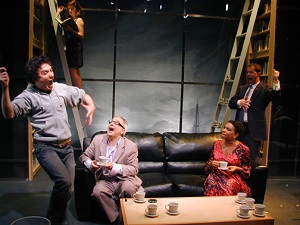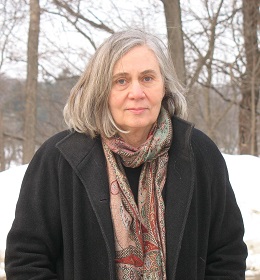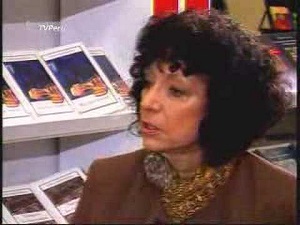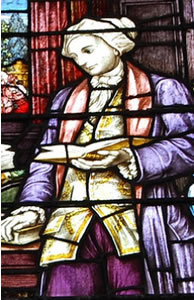De Frans-Roemeense schrijver Eugène Ionesco werd geboren op 26 november 1912 in Slatina, Roemenië. Zie ook alle tags voor Eugène Ionesco op dit blog.
Uit: Victims of Duty
«A petit bourgeois interior. CHOUBERT is sitting inan armchair near the table reading a newspaper. MADELEINE, his wife, is sitting at the table darningsocks. Silence
MADELEINE: [ pausing in her work ] Any news in the paper?
CHOUBERT: Nothing ever happens. A few comets and a cosmicdisturbance somewhere in the universe. Nothing to speak of.The neighbors have been fined for letting their dogs make amess on the pavement…
MADELEINE: Serve them right. It’s horrible when you step onit.
CHOUBERT: And think of the people on the ground floor,opening their windows in the morning to see that ! Enough toput them in a bad mood for the rest of the day.
MADELEINE: They’re too sensitive.
CHOUBERT: It’s the times we live in; all nerves. Nowadaysmen have lost the peace of mind they had in the past. [Silence]Oh, and here’s an official announcement.
MADELEINE: What’s it say?
CHOUBERT: It’s quite interesting. The Government’s urging allthe citizens of the big towns to cultivate detachment.Accord-ing to this, it’s our last hope of finding an answer to theeco-nomic crisis, the confusion of the spirit and the problemsof existence.
MADELEINE: We’ve tried everything else, and it hasn’t doneany good, but I don’t suppose it’s anyone’s fault.
CHOUBERT: For the time being the Government’s merelyrecom-mending this ultimate solution in a friendly manner.They can’t fool us; we know how a recommendation has a wayof turning into an order.
MADELEINE: You’re always so anxious to generalize!
CHOUBERT: We know how suggestions suddenly come to look like rules, like strict laws.»

Eugène Ionesco (26 november 1912 – 28 maart 1994)
Scene uit ‘Victims of Duty’, Cutting Ball Theater, San Francisco, 2008
De Amerikaanse schrijfster Marilynne Robinson werd geboren in Sandpoint, Idaho op 26 november 1943. Zie ook alle tags voor Marilynne Robonson op dit blog.
Uit: Home
“And there was Ames, her father’s alter ego, in whom he had confided so long and so utterly that he was a second father to them all, not least in the fact of knowing more about them than was entirely consistent with their comfort. Sometimes they made their father promise not to tell anyone, by which he knew they meant Reverend Ames, since he was far too discreet to repeat any confidence, except in the confessional of Ames’s stark bachelor kitchen, where, they suspected, such considerations were forgotten. And what was their father not to tell? How they informed on Jack, telling him what Jack had said, what Jack had done or seemed inclined to do.
“I have to know,” their father said. “For his sake.” So they told on their poor scoundrel brother, who knew it, and was irritated and darkly amused, and who kept them informed or misinformed and inspired urgent suspicions among them which they felt they had to pass on, whatever their misgivings, to spare their father having to deal with the sheriff again. They were not the kind of children to carry tales. They observed a strict code against it among themselves, in fact, and they made an exception of Jack only because they were afraid to do otherwise. “Will they put him in jail?” they asked one another miserably when the mayor’s son found his hunting rifle in their barn. If they had only known, they could have returned it and spared their father surprise and humiliation. At least with a little warning he could have composed himself, persuaded himself to feel something less provocative than pure alarm.
But no, they did not put him in jail. Jack, standing beside his father, made yet another apology and agreed to sweep the steps of the city hall every morning for a week. And he did leave the house early every morning. Leaves and maple wings accumulated at city hall until the week was over and the mayor swept them up. No. His father would always intercede for him. The fact that his father was his father usually made intercession unnecessary. And that boy could apologize as fluently as any of the rest of the Boughtons could say the Apostles’ Creed.”

Marilynne Robinson (Sandpoint, 26 november 1943)
De Argentijnse schrijfster Luisa Valenzuela werd geboren op 26 november 1938 in Buenos Aires. Zie ook alle tags voor Luisa Valenzuela op dit blog.
Uit:The Censors (Vertaald door Frank Thomas Smith)
« It’s true that on the third day a letter blew a fellow-worker’s hand off and disfigured his face, but the bureau chief claimed it had been mere negligence on the victim’s part and Juan and the other employees could continue working as before, although with much less assurance. At quitting time another fellow worker tried to organize a strike to demand more pay for hazardous work, but Juan didn’t participate and after thinking it over a while he denounced him to the authorities in order to be promoted.
Once doesn’t form a habit, Juan thought as he left the chief’s office, and when they transferred him to Section J where they unfold the letters with infinite care to see if they contain poisonous powder, he felt that he had ascended a step and could therefore return to his healthy habit of not getting involved in external affairs.
From J, thanks to his merits, he rose rapidly until reaching E, where the work became more interesting, for there begins the reading and analysis of the letters. In that Section he could even cherish hopes of coming across his own missive written to Mariana which, judging by the time elapsed, should have reached this level after a very long procession through the other departments.»

Luisa Valenzuela (Buenos Aires, 26 november 1938)
De Vlaamse dichter, schrijver en columnist Louis Verbeeck werd geboren in Tessenderlo op 26 november 1932. Zie ook alle tags voor Louis Verbeeck op dit blog.
GRAFSCHRIFT VAN MIJN VOETEN
Wanneer ik dood en ver van hier
Zal liggen onder groene grassen
Zet dan geen bloemen op mijn zerk
Stouw geen fanfare naar de kerk
Maar zorg dan dat mijn schoenen passen.
Want ver zal ik nog moeten gaan
Om in het paradijs te mogen…
Lees dus geen rede op mijn graf
Al schrijft ge ze waarschijnlijk af,
Maar denk eens aan mijn eksterogen.
Louis Verbeeck (Tessenderlo, 26 november 1932)
De Engelse dichter William Cowper werd geboren op 26 november 1731 in Berkhamstead, Herford. Zie ook alle tags voor William Cowper op dit blog.
Happy Solitude–Unhappy Men
My heart is easy, and my burden light;
I smile, though sad, when thou art in my sight:
The more my woes in secret I deplore,
I taste thy goodness, and I love thee more.
There, while a solemn stillness reigns around,
Faith, love, and hope within my soul abound;
And, while the world suppose me lost in care,
The joys of angels, unperceived, I share.
Thy creatures wrong thee, O thou sovereign good!
Thou art not loved, because not understood;
This grieves me most, that vain pursuits beguile
Ungrateful men, regardless of thy smile.
Frail beauty and false honour are adored;
While Thee they scorn, and trifle with thy Word;
Pass, unconcerned, a Saviour’s sorrows by;
And hunt their ruin with a zeal to die
. 
William Cowper (26 november 1731 – 25 april 1800)
Dedail uit glas-in-loodraam, St. Nicholas’ Church, Dereham
Zie voor nog meer schrijvers van de 26e november ook mijn blog van 26 november 2011.
